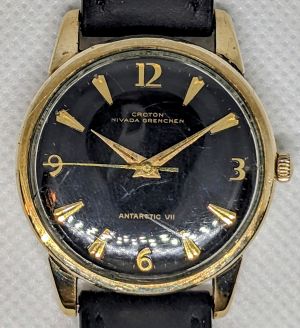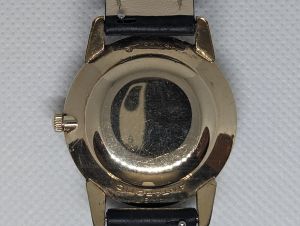Nivada Antarctic Roman Numeral (ARN) models: Difference between revisions
JuanNephrota (talk | contribs) Corrected information on Antarctic VII |
JuanNephrota (talk | contribs) Updated photo of VII |
||
| Line 68: | Line 68: | ||
* plain unsigned crown | * plain unsigned crown | ||
* split stem | * split stem | ||
[[File:AntarcticVII-front.jpg|thumb|Antarctic VII (Peter Marsh) ]] | [[File:AntarcticVII-front-cropped.jpg|thumb|Antarctic VII (Peter Marsh) ]] | ||
[[File:AntarcticVII-back.jpg|thumb|Antarctic VII (Peter Marsh) ]] | [[File:AntarcticVII-back.jpg|thumb|Antarctic VII (Peter Marsh) ]] | ||
Revision as of 17:47, 27 January 2023
Nivada Antarctic Roman Numeral (ARN) models
Antarctic II
MORE INFORMATION REQUIRED
Antarctic III
Additional variety was introduced by with Version 3. A move towards a more formal dress style saw thinner lugs and bezels and away from the original explorer concept. The crowns are unsigned and less substantial than the original scallop shape (which had first been seen on the original Aquamatics from the early 1950s).
Most dials have been observed with some marking- they are very prone to wear, damage and water ingress sadly. The unsmooth surface of the linen dial attracts dust and traps moisture. Pristine examples command a premium and will normally be NOS unworn. Another factor is the lacquer or varnish used on dials in this period by Nivada. It is prone to yellowing and discolouring as well as crazing, particularly if there has been any damp ingress, a distinct possibility with the non screwdown crown and a model marketed as waterproof. Very often a white dial (the Antartctic default dial colour) will appear at first glance to be cream or yellow. This can have a charm all its own - all dependent on the individual collectors eye for patina.
At some point around 1960 the font changed from a straight simple uppercase san serif to a stylised wavy written style for the word Antarctic. This is also seen in adverts at the time.
The automatic calibers are normally ETA movements with signed rotor and COW stamped on US models marketed by Croton.
ARNIII V1 Straight Text
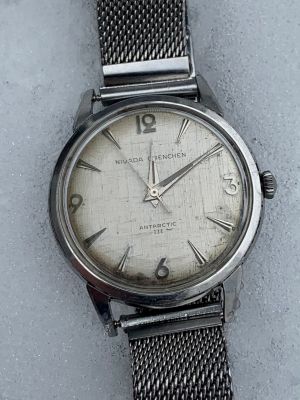
- Circa 1959-1964
- Normally seen with linen dial, silver markers and lumed silver hands, radium or tritium. Models post 1963 have T on the dials.
- Diameter (excluding crown): 35mm
- Lug to lug: 42mm
- Lug width: 18mm
- Height: 10mm
- Movement: ETA 2451 and 2651 with various jewel counts including 17, 21 and 30 which may also appear on dial.
- Power reserve: ~40 hours
- Case: All stainless steel with 6 point screwback
- Straight lugs with bevel edge and drilled holes
- Plain unsigned crown
- Domed Crystal
ARNIII V2 Wavy Text
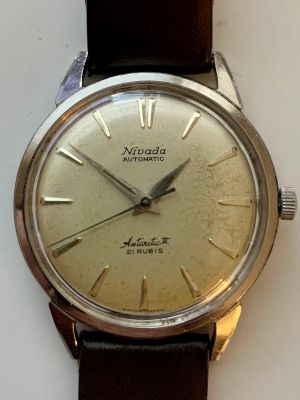
- Circa 1959-1964
- Normally seen with plain dial where the lacquer has discoloured to yellow from original white.
- Silver baton markers and lumed silver hands. Swiss Made on dial at 6.
- Diameter (excluding crown): 34.6mm
- Lug to lug: 40.6mm
- Lug width: 17.8mm
- Height: 9.6mm
- Movement: ETA 2451 21 jewel count on dial.
- Case: All stainless steel with 6 point screwback marked A6 (ref?) and Antarctic engraved
- Straight lugs with bevel edge and drilled holes
- Plain unsigned crown
- Domed Crystal
Antarctic IV
Gold plated version of the Antarctic III. Same font style, linen dial and gold markers. Crown slightly larger than the steel version. ETA movement again with 17, 21 or 30 jewel count.
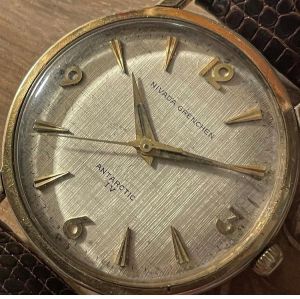
Antartic V
EXAMPLES NEEDED
Antarctic VI
Square man's dress watch in compressor style Aquadatic case with 4 screws holding gold plated outer case. A small automatic movement with scallop crown.
- Automatic
- 28.4mm width ex crown
- 35mm length
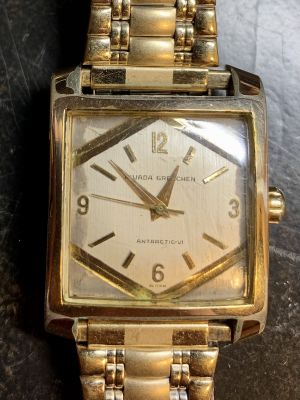
Antarctic VII
A round one piece front loading case.
- Automatic
- width ex crown: 33mm
- lug to lug: 40mm
- height: 10mm
- lug width: 17mm
- case: 10k g.f.
- plain unsigned crown
- split stem
